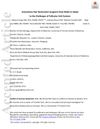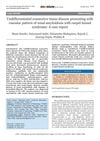 7 citations,
July 2018 in “International Journal of Applied Pharmaceutics”
7 citations,
July 2018 in “International Journal of Applied Pharmaceutics” Chitosan nanoparticles are promising for sustained caffeine delivery through the skin.
[object Object]  16 citations,
March 2005 in “Journal of The American Academy of Dermatology”
16 citations,
March 2005 in “Journal of The American Academy of Dermatology” A boy with Sjogren-Larsson syndrome has skin and muscle symptoms due to a specific enzyme deficiency.
19 citations,
January 2011 in “International journal of trichology” A 3-year-old boy had a rare hairball condition usually seen in teenage girls.
 1 citations,
January 2018
1 citations,
January 2018 Tattooing guidelines focus on safety, hygiene, and following rules.
 January 2019 in “ARC journal of pharmaceutical sciences”
January 2019 in “ARC journal of pharmaceutical sciences” Acne can be managed with various treatments and requires psychological support due to its emotional impact.
 18 citations,
August 2019 in “Drug Development and Industrial Pharmacy”
18 citations,
August 2019 in “Drug Development and Industrial Pharmacy” Quercetin-loaded nanoparticles can penetrate skin, minimize hair loss, and promote hair regrowth, showing slightly better results than a marketed product.
 1 citations,
January 2019 in “Medical principles and practice”
1 citations,
January 2019 in “Medical principles and practice” A boy's hair loss improved after tumor removal and vitamin D treatment, but hair loss returned despite normal vitamin D and no tumor regrowth.
1 citations,
April 2022 in “Applied sciences” Bitter melon extract may help prevent hair loss and can be used in cosmetic products.
 1 citations,
February 2023 in “Journal of cosmetic dermatology”
1 citations,
February 2023 in “Journal of cosmetic dermatology” PRP use in skin care and plastic surgery is growing, especially in the U.S. and Italy.
 47 citations,
March 2016 in “Journal of dermatology”
47 citations,
March 2016 in “Journal of dermatology” Understanding the genetics of rare inherited ichthyosis syndromes is key for better treatments and genetic counseling.
1 citations,
August 2016 in “Hanbang an'i'bi'in'hu pibu'gwa haghoeji” YangHyulEum Gami-Bang extract may help treat hair loss.

The document concludes that Syndromes of Severe Insulin Resistance are rare disorders with limited treatment options.
 1057 citations,
November 2011 in “Annals of Biomedical Engineering”
1057 citations,
November 2011 in “Annals of Biomedical Engineering” Low-level Laser Therapy may help reduce inflammation, pain, and aid healing, but more research is needed to confirm its effectiveness and establish standard treatment guidelines.
 9 citations,
May 2020 in “Journal of Cosmetic Dermatology”
9 citations,
May 2020 in “Journal of Cosmetic Dermatology” Hair restoration surgeons have improved follicular unit excision (hair transplant method) by using innovative tools and techniques, reducing hair damage and increasing success rates.
 July 2011 in “British Journal of Dermatology”
July 2011 in “British Journal of Dermatology” Dermatologists give better information on pathology forms, hypersensitivity vasculitis is a common skin issue, misdiagnoses can occur, and various skin conditions are linked to loss of elastin or genetic factors.
 12 citations,
January 2020 in “Analyst”
12 citations,
January 2020 in “Analyst” Researchers found markers that can tell if hair has been bleached, which could improve hair test accuracy.
 January 2025 in “Current Issues in Molecular Biology”
January 2025 in “Current Issues in Molecular Biology” Certain plant extracts may help prevent hair loss and promote hair growth safely.
 1 citations,
February 2014 in “Analytical Letters”
1 citations,
February 2014 in “Analytical Letters” The method accurately measures the amount of ketoconazole in anti-dandruff shampoo and cream, and can also be used to monitor the drug in human plasma.
 8 citations,
December 1981 in “Journal of The American Academy of Dermatology”
8 citations,
December 1981 in “Journal of The American Academy of Dermatology” The document concludes that parathyroid diseases have a range of clinical features and outcomes, with some conditions being treatable and others having a high risk of mortality.
 January 1998 in “Lasers in Surgery and Medicine”
January 1998 in “Lasers in Surgery and Medicine” Lasers are effective and safe for various medical treatments, including cancer, wound healing, and skin conditions.
 81 citations,
May 2007 in “Fertility and Sterility”
81 citations,
May 2007 in “Fertility and Sterility” Testosterone therapy seems safe for postmenopausal women for a few years, but more research is needed for long-term effects.
[object Object]  9 citations,
June 2014 in “European Journal of Obstetrics & Gynecology and Reproductive Biology”
9 citations,
June 2014 in “European Journal of Obstetrics & Gynecology and Reproductive Biology” Blood AMH levels are higher in women with PCOS than in those with other similar conditions.
 9 citations,
July 2002 in “Journal of the European Academy of Dermatology and Venereology”
9 citations,
July 2002 in “Journal of the European Academy of Dermatology and Venereology” The document concludes that fexofenadine reduces inflammation in chronic hives, cholestyramine helps half of pregnant women with itchy rashes, and relaxing incisions are a good alternative in facial surgery for the elderly.
 4 citations,
November 2016 in “Pediatric Clinics of North America”
4 citations,
November 2016 in “Pediatric Clinics of North America” The document explains the difficulty in diagnosing and treating brain diseases caused by the immune system and stresses the need for quick and accurate tests.
 January 2014 in “International Journal of Case Reports and Images”
January 2014 in “International Journal of Case Reports and Images” A woman with undifferentiated connective tissue disease was diagnosed with renal amyloidosis and carpal tunnel syndrome.
 16 citations,
March 2000 in “Clinical Biochemistry”
16 citations,
March 2000 in “Clinical Biochemistry” Women with hair loss had higher levels of certain hormones, suggesting a link to a condition like PCOS.
 5 citations,
January 1998 in “Clinical and experimental dermatology”
5 citations,
January 1998 in “Clinical and experimental dermatology” Myotonic dystrophy should be considered in patients with hair thinning, and genetic counseling is important.
 1 citations,
August 2017 in “Asian Journal of Pharmaceutical and Clinical Research”
1 citations,
August 2017 in “Asian Journal of Pharmaceutical and Clinical Research” The 1% ethyl acetate fraction ethosomal gel from Nothopanax scutellarium leaves promotes hair growth but can mildly irritate the skin.
 10 citations,
May 2018 in “Forensic Science International”
10 citations,
May 2018 in “Forensic Science International” Shrunken heads retain some facial features and hair characteristics, allowing for limited individual identification.
April 2024 in “Journal of clinical medicine” Recognizing specific skin features helps diagnose and manage lupus erythematosus effectively.


























